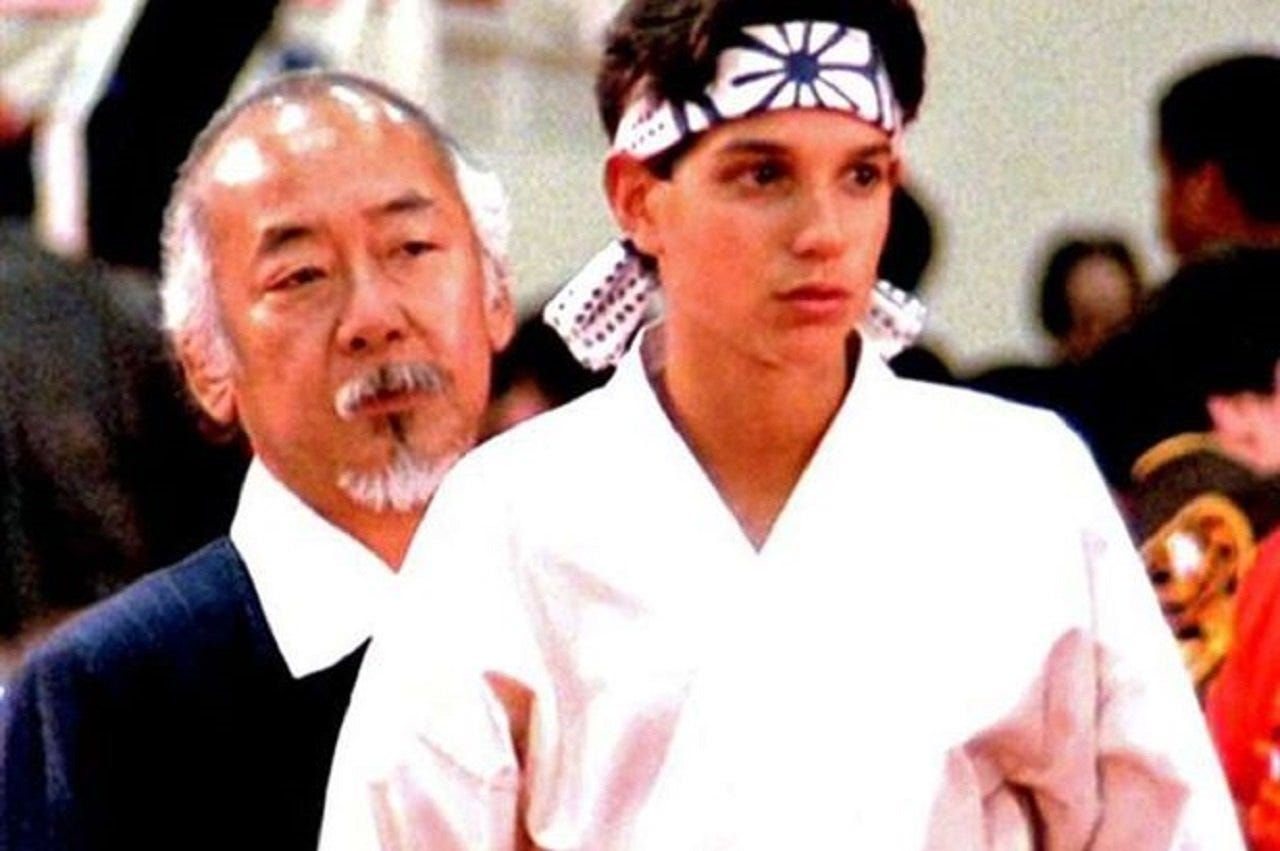For anyone who thinks of capitalism as an essentially infantilising force - one that values economic over personal development, works by instilling need and insecurity, and leaves our culture and politics open to armies of mewling, strapped-to-the-tit manboys who throw loud tantrums whenever they can't get what they want - our newly reopened multiplexes make for an interesting study. What's immediately noticeable is how many childhood favourites have been recalled to plug gaps in the still-patchy release schedule: various titles from the Star Wars, Lord of the Rings and Harry Potter series have returned to the box-office top ten in recent weeks, and the reissues continued last weekend with the original 1984 version of The Karate Kid. Easy to see why the chains are booking these tried-and-tested crowdpleasers. Most are aimed at a family audience, allowing the sale of multiple tickets in one transaction, which helps claw back some of that revenue lost during full lockdown. Yet these known narratives, going exactly the way we all remember, also contribute towards a reassuring idea of the cinema as safe space: they remind us How Things Were, even as the masked clientele and hand-sanitiser stations point up How Things Actually Are. You and I might question the effectiveness of a business model that exposes the customer to an enhanced level of risk, but that's what happens when you elect a Government that puts short term gain over any kind of sustainable future, that asks us to trust the likes of Grant Shapps and Matt Hancock when they insist everything's just fine and dandy. Our capitalists have long relied upon their marks to be as credulous as children; there are those who need us to believe in "the magic of the movies" now more than ever.
Anyhow: revisiting The Karate Kid for the first time since Mini-Mike sat before a toploading VCR back in the day, what Maxi-Mike noticed was how much care had been devoted to it, care all involved probably wouldn't have needed to take for it to be the hit it was. Back in '84, this was Columbia Pictures recruiting John G. Avildsen to remake his major late Seventies success Rocky for the burgeoning teen market. It seems a little undercast - the most prominent face, even at the time, would have been Elisabeth Shue, adorable from the off as a soccer-shorted all-American gal - but Avildsen let it run for two hours (grown-up length, not to mention almost exactly Rocky length), shot it in widescreen, and gave it a burnished Californian look that elevates it above a lot of fly-by-night teen fodder. It's not The Black Stallion - the high watermark of craft in early Eighties family entertainment - but clearly dates from the same period, when the studios were still working hard to cultivate a particular audience. Unexpectedly, the story appears more alive than ever in 2020. Its central conflict pits immigrants - Italian-American punchbag Daniel LaRusso (Ralph Macchio), recent arrival in L.A. from New Jersey (ultra-Eighties plot point: his mum has a new job in computers) and his Japanese mentor Mr. Miyagi (Noriyuki "Pat" Morita) against the Teutonically blonde ranks of local karate academy Cobra Kai, such a death squad they literally dress as skeletons for the school Halloween ball. There may be a reason why the YouTube spin-off series Cobra Kai - overseen by Harold and Kumar's race-savvy Jon Hurwitz and Hayden Schlossberg - launched in 2018, mid-Trump; we get a glimmer of things to come in the film when Miyagi is dissed as a "pet Nip" by a yahoo in a red baseball cap, played by Larry Drake, no less.
If it lacks the scrappy immediacy Avildsen (and crucially Stallone) brought to Rocky, very much a Seventies movie in its grit, that's because a chunk of the first half is stuck in the same colour-coordinated L.A. high school that featured in 70-75% of all Eighties teen movies. Avildsen has his hands tied with those sequences that oblige him to evoke teenage life: the montage that finds Macchio and Shue on a bouncy castle and playing crazy golf is a pre-eminent example of PG-rated kitsch, utterly detached from what actual teens would be getting up to after dark circa 1984. Still, he was a canny enough director to know he was onto something special with the relationship between Daniel and Miyagi, which is also to say the relationship between innocence and experience. I wonder what Japanese-American observers now make of this character, but Morita plays him with such dignity - and such joyful mischief - that Miyagi is a character, and not a stereotype. When he gets drunk and lets slip the sorry story of his late wife's demise, we bear witness to one of the few moments of Genuine Acting in an Eighties Teen Movie. (Another indication that everyone involved was giving of their best: Morita landed an Academy Award nomination for it.) Even more affecting, in the long haul, is the effect Morita has on his co-star. Macchio is no more than a saucer-eyed sweetheart in the high-school scenes, but he seems to grow physically under Morita's tutelage, becoming someone who could credibly kick Cobra Kai caboose, and someone almost worthy of the plainly-several-years-more-mature Shue. The reliably stirring spectacle of the final-reel All-Schools Tournament (and "You're the Best", in which Bill Conti does his best to match "Gonna Fly Now") awaits, but Avildsen and writer Robert Mark Kamen spend the run-up to it paring away all that is bland, trite, inessential: the movie still works because it works out what matters. One hopes that cinemagoers tempted back into the Odeon after the Great Pause of 2020 can do likewise.
The Karate Kid is now playing in cinemas nationwide, and streaming on Netflix; Cobra Kai is available to stream on Netflix from today.

No comments:
Post a Comment